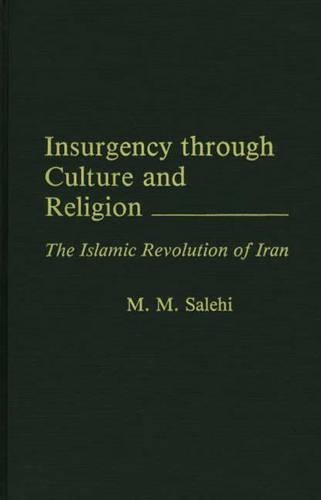
Insurgency Through Culture and Religion: The Islamic Revolution of Iran
(Hardback)
Publishing Details
Insurgency Through Culture and Religion: The Islamic Revolution of Iran
By (Author) Mohammd M. Salehi
Bloomsbury Publishing PLC
Praeger Publishers Inc
17th October 1988
United States
Classifications
Tertiary Education
Non Fiction
Islam
955.054
Physical Properties
Hardback
196
Description
The Iranian middle class played a historical role in steering Iran into the revolution of 1978. This volume traces the ideological content of the revolution, as well as the cultural and political outlooks that forced mass support in different segments of the Iranian middle class. The author asserts that potential existed in Iranian society for the outbreak of revolution long before 1978. He addresses the basic question of why the revolution of 1978-79 triumphed with the Shiia clergymen playing a leading role and ties together the psychological, cultural and religious roots of the revolution with class theory.
Reviews
In his case study of the 1979 Islamic revolution, Salehi discusses the role of culture and religion in a modern society. The author examines Shi'ism as a vehicle of political activism and dissent and provides an insider's view of events leading to the 1979 Iranian revolution. Although Salehi seeks to make a contribution to theoretical inquiry into the sociology of modernization, the sociology of revolution, and the social study of culture and religion, he focuses more on historical background, fact, and experience than on analysis and theoretical insight. The author suggests that modernization theory and single-factor causes of revolution be examined in a holistic manner, but he does not define what a holistic approach is (nor does he explain his methodology for participant observation.) Salehi explains that this approach neither ignores nor discounts the significance of facts. The book provides an interesting perspective on the psychological undercurrents of life in an oppressive society. A rich source of information on the Islamic revolution for upper-division undergraduates and graduate students. * Choice *
Author Bio
M.M. Salehi was a member of the faculty of sociology at the National University of Iran for more than a decade. In Iran he published a number of sociology textbooks and papers. He was also active in team research on industrial studies and planning for the country. Recently, he came to the United States. He is currently advancing his quantitative knowledge and skills for social research and at the same time is finalizing reports of some of the social studies he had undertaken in Iran. He holds an engineering degree from Purdue University and a PhD in sociology from the Michigan State University. He has taught sociology at a number of American universities.
